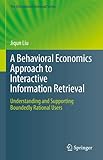A Behavioral Economics Approach to Interactive Information Retrieval [electronic resource] : Understanding and Supporting Boundedly Rational Users /
Material type: TextSeries: The Information Retrieval Series ; 48Publisher: Cham : Springer International Publishing : Imprint: Springer, 2023Edition: 1st ed. 2023Description: XVI, 211 p. 1 illus. online resourceContent type:
TextSeries: The Information Retrieval Series ; 48Publisher: Cham : Springer International Publishing : Imprint: Springer, 2023Edition: 1st ed. 2023Description: XVI, 211 p. 1 illus. online resourceContent type: - text
- computer
- online resource
- 9783031232299
- 025.04 23
- QA75.5-76.95
This book brings together the insights from three different areas, Information Seeking and Retrieval, Cognitive Psychology, and Behavioral Economics, and shows how this new interdisciplinary approach can advance our knowledge about users interacting with diverse search systems, especially their seemingly irrational decisions and anomalies that could not be predicted by most normative models. The first part “Foundation” of this book introduces the general notions and fundamentals of this new approach, as well as the main concepts, terminology and theories. The second part “Beyond Rational Agents” describes the systematic biases and cognitive limits confirmed by behavioral experiments of varying types and explains in detail how they contradict the assumptions and predictions of formal models in information retrieval (IR). The third part “Toward A Behavioral Economics Approach” first synthesizes the findings from existing preliminaryresearch on bounded rationality and behavioral economics modeling in information seeking, retrieval, and recommender system communities. Then, it discusses the implications, open questions and methodological challenges of applying the behavioral economics framework to different sub-areas of IR research and practices, such as modeling users and search sessions, developing unbiased learning to rank and adaptive recommendations algorithms, implementing bias-aware intelligent task support, as well as extending the conceptualization and evaluation on IR fairness, accountability, transparency and ethics (FATE) with the knowledge regarding both human biases and algorithmic biases. This book introduces a behavioral economics framework to IR scientists seeking a new perspective on both fundamental and new emerging problems of IR as well as the development and evaluation of bias-aware intelligent information systems. It is especially intended for researchers working on IR and human-information interaction who want to learn about the potential offered by behavioral economics in their own research areas.


There are no comments on this title.